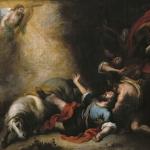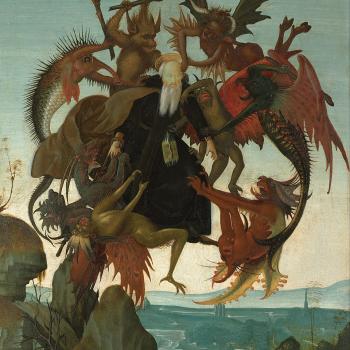
Unity in diversity is important to the Christian faith. Each person should be given the freedom to express and develop themselves, that is, to engage grace in their own unique fashion. This freedom, therefore, will create a great diversity, as the way people develop themselves will differ from each other. Nonetheless, they should be reminded that that they are not islands all unto themselves. No one can and will be independent from everyone else. Persons, by their nature, are interdependent with each other. To truly realize who and what they are, to come to know themselves, they must be able to know how they are related to and united with the rest of humanity. In doing so, they will see that it is in and through the relations they build with humanity their true selves are also revealed, relations which prove how and why each person is unique. Then, with that uniqueness, they will be able to discern how they should best engage God and the grace God offers them, an engagement which will prove different from person to person (though, certainly, as all persons share much in common, due to their humanity, they will also share much in common in as well, so not everything they receive will be different). There is not just a “one-size fits all” response from God, but rather, God interact with everyone, respecting their differences. The desert fathers and mothers understood this; instead of thinking every ascetic can be and will be the same, they promoted a diversity of practices within their communities, practices which demonstrated the uniqueness of each of the desert fathers and mothers, and yet practices which were related to each other because they are brought to perfection by the same source, the Holy Spirit:
Abba Poeman said that Abba John said that the saints are like a group of trees, each bearing different fruit, but watered from the same source. The practices of one saint differ from those of another, but it is the same Spirit that works in all of them.[1]
The supernatural source of grace, God, infinitely transcends humanity, and so it has the potential to provide for and affirm the diversity of human persons while also promoting and establishing their unity. God draws them together, drawing them from their isolation to join themselves with the body of Christ. God does so in such a way that their relative distinctions, their uniqueness is preserved, just as a body can and does have many different, distinct, members with their own unique qualities. Yet, when they find themselves united to Christ, a part of the body of Christ, they find they have a share in the “Spirit of Christ,” that is, the Holy Spirit, who reinforces their unity, working in all of them, giving them the love and grace they need not only to fulfill themselves, but to recognize how such fulfillment can only happen in unity with the rest of the body of Christ.
The Holy Spirit is the Spirit of love, so that those who work with and cooperate with the Spirit, in whatever spiritual practice they engage, they will find the Spirit will produce in in them greater and greater love, a love which will then have them look to and embrace others with that love, a love which will open them up to greater and greater communion with others. Love is what allows for the diversity in unity, as it gives people the freedom they need to be true to themselves but also has them find their true self in relation to others and the communion they have with them.
Therefore, we should not expect everyone to be the same. We should not expect everyone to engage the faith in the exact same way. Christians will put their faith into practice in a great variety of ways, ways which relate to their own personal distinctions. When we try to reduce the practice of the faith into a strict, legalistic practice, trying to say there is but one way which must be followed, the faith itself is diminished as the bonds of love are undermined. Such legalism denies the freedom which love promotes, leaving behind an unloving, cold, calculating faith, as the mystery of the faith is transformed into rote memorization of facts and mere ritual. This is not to the faith should be some sort of free for all, where anything Christians want to do or believe is fine, because that is not the case; there are expectations which all Christians are meant to follow, expectations which demonstrate their unity, as they follow the teachings handed down to them throughout the generations as well as those practices which help reinforce the bonds of love they are meant to have with each other (and the rest of humanity). Jesus made it clear, the foundation of the spiritual law, the foundation of our moral consideration, should be love, love for God and for our neighbor. It is this love which opens us up beyond ourselves to accept the grace we need for our perfection, and it is this love which allows us, therefore, to become who we are meant to be in Christ. It is this love which, sadly, has often been lost, as many Christians look at the faith only through legalistic eyes, trying to promote their own particular way as the absolute, universal way meant for all. Christians need to accept diversity, and with it, grow in love, for then, through such love, they will find that they will grow closer, not further apart, from each other (and the rest of creation):
The power of love is to unite what has been separated or divided. It brings into harmony and unity a diversity without destroying the differences. It, rather, exalts the diversity into a uniqueness so that the love of God is glorified in such individuated love for each of His creatures. The more you are raised by God’s Spirit to the intimate presence of God, Father, Son and Spirit, living and loving within you with an infinite love, the more you and all the saints in Christ begin to enter into communion, a union with other human beings and, also, in union with all other creatures.[2]
This, of course, is what has been revealed to us as Christians through the incarnation, for through it, not only are we shown that the diversity of the persons of the Trinity are united with each other in love, we are also shown it is that love which they have which led them to create the world which we live in. That love also has them make room for creation, for created subjects, to be drawn into and participate in the divine life. And so, we, as Christians, are expected to engage the faith through love, to follow the promptings of love, to open ourselves up to others with love, to affirm them and their uniqueness with love, making room for them in our lives with love; the more we do so, the more we will form the bond of love God wants us to have, the bond which allows us to be united with everyone else while still affirming the distinction of persons in that unity.
[1] The Sayings of the Desert Fathers. Trans. Benedicta Ward (Kalamazoo, MI: Cistercian Publications, 1984), 95 [Abba John the Dwarf #43].
[2] George A. Maloney, SJ, Communion of Saints (Hauppauge, NY: Living Flame Press, 1988), 121.
Stay in touch! Like A Little Bit of Nothing on Facebook.
If you liked what you read, please consider sharing it with your friends and family!
N.B.: While I read comments to moderate them, I rarely respond to them. If I don’t respond to your comment directly, don’t assume I am unthankful for it. I appreciate it. But I want readers to feel free to ask questions, and hopefully, dialogue with each other. I have shared what I wanted to say, though some responses will get a brief reply by me, or, if I find it interesting and something I can engage fully, as the foundation for another post. I have had many posts inspired or improved upon thanks to my readers.













